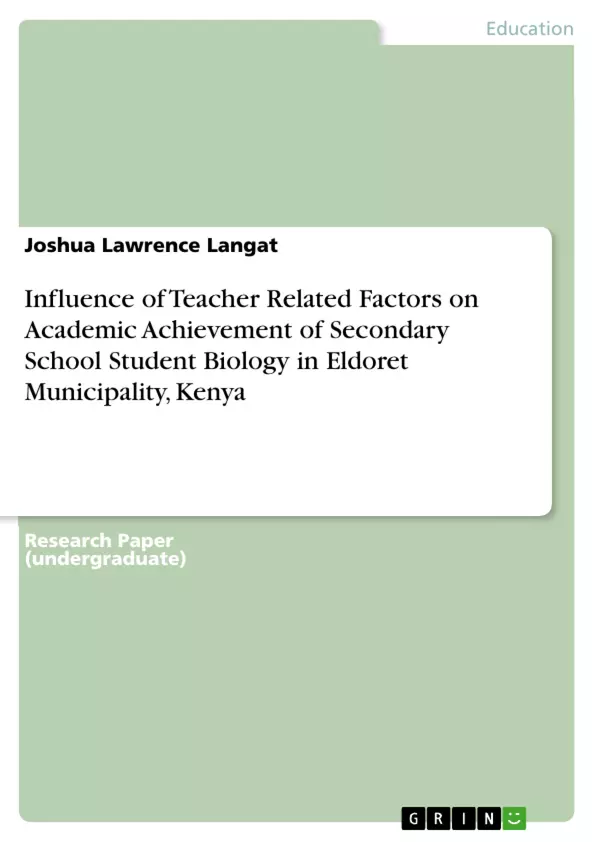With the rapid developments in science and technology, biology, which is one of the fundamental to many disciplines has becomes increasingly important. The number of compounds and their many different applications begs the question, how can we teach all the knowledge to students? To meet with the needs of society, reform in biology teaching has taken place all over the world. However, we cannot teach students everything in this rapidly developing world. Accordingly, most academics agree that we should just teach students how to learn and apply biology. It is also the case that if people want to keep up with the development of knowledge, they should keep studying and assessing all their lives. However because the reformat has concentrated on knowledge structures, our teaching methods are still teacher-centered, not student-centered and do not encourage students to achieve lifelong learning and assessment.
The purpose of this study was to examine the relationship between Teacher self-efficacy, interest, attitude, qualification, experience and pupils’ academic achievement in secondary school biology. The participants of the study comprises of 254 secondary school teachers and 120 secondary school students. Data collected on the study were analyzed using a stepwise multiple regression analysis. The results reveals that teacher self-efficacy and interest had significant correlation with students achievement scores.
Teacher’s self-efficacy being the best predictor of students’ academic achievement in biology was followed by teacher’s interest. Attitude, qualification and experience were not significant correlation with pupil’s achievement in biology. The study recommended that it is high time for primary school biology teachers to have a change of attitude towards the teaching of the subject so that the achievement of universal basic education will not be hindered. Furthermore, primary school educational authorities were called upon to ensure that only teachers who are qualified to teach the subject are employed. Not these alone, their attention was also drawn to the fact that they should design educational programmes that will enhance the teacher self-efficacy for a better prediction of pupils’ achievement in Biology.
Table of Contents
- ABSTRACT
- INTRODUCTION
- STATEMENT OF THE PROBLEM
- MATERIALS AND METHODS
- STUDY RESULTS
- DISCUSSION
- CONCLUSIONS
- IMPLICATIONS
- REFERENCES
Objectives and Key Themes
This study investigates the relationship between teacher-related factors and the academic achievement of secondary school biology students in Eldoret Municipality, Kenya. It aims to determine if teacher self-efficacy, interest, attitude, qualification, and experience influence student performance in biology. The study seeks to understand how these factors contribute to student success and identify strategies to enhance teaching practices for better student outcomes.
- Teacher self-efficacy and its impact on student achievement
- The role of teacher interest in fostering student engagement and learning
- The influence of teacher attitude, qualification, and experience on student performance in biology
- Identifying effective teaching practices that promote student success in biology
- Exploring strategies to improve teacher training and development in biology education
Chapter Summaries
- Abstract: This chapter provides a concise overview of the study, including its objectives, methodology, findings, and conclusions. It emphasizes the importance of teacher self-efficacy and interest in predicting student achievement in biology.
- Introduction: This chapter discusses the significance of biology education in the context of scientific advancements and the need for effective teaching methods to meet the evolving demands of society. It highlights the importance of teacher-related factors in influencing student performance in biology.
- Statement of the Problem: This chapter outlines the research problem by examining the challenges faced by teachers in producing high-achieving students. It emphasizes the need for effective teaching strategies that promote holistic learning and student engagement.
- Materials and Methods: This chapter details the research methodology, including the study design, participants, data collection methods, and data analysis techniques.
- Study Results: This chapter presents the findings of the study, including statistical analysis of the relationship between teacher-related factors and student achievement in biology.
Keywords
The study focuses on the key concepts of teacher self-efficacy, interest, attitude, qualification, experience, and their impact on pupils' academic achievement in biology. It explores the relationships between these variables, aiming to contribute to the understanding of effective teaching practices and student success in the subject.
Frequently Asked Questions
Which teacher-related factor is the strongest predictor of student success in biology?
According to the study, teacher self-efficacy is the best predictor of students' academic achievement in biology, followed by the teacher's interest in the subject.
Do teacher qualifications and experience significantly affect biology grades?
The results of this specific study in Eldoret Municipality revealed that teacher qualification and experience did not have a significant correlation with pupils' achievement in biology.
What was the methodology used in this research?
The study involved 254 secondary school teachers and 120 students. Data were analyzed using a stepwise multiple regression analysis to identify correlations between various factors and achievement scores.
What are the recommendations for educational authorities?
The study suggests that authorities should ensure only qualified teachers are employed and design educational programs specifically aimed at enhancing teacher self-efficacy.
How should the teaching of biology change according to the abstract?
The research advocates for a shift from teacher-centered to student-centered methods that encourage lifelong learning and better assessment practices, rather than just focusing on knowledge structures.
- Citar trabajo
- Joshua Lawrence Langat (Autor), 2018, Influence of Teacher Related Factors on Academic Achievement of Secondary School Student Biology in Eldoret Municipality, Kenya, Múnich, GRIN Verlag, https://www.grin.com/document/425390



